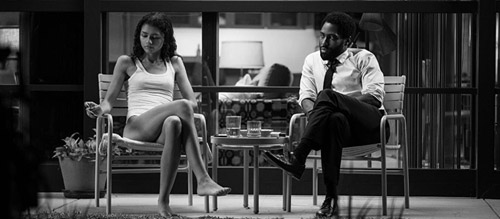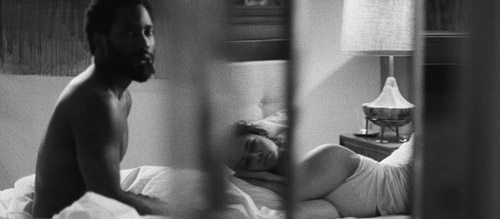Malcolm and Marie (2021) Review
Malcolm & Marie (2021)
Director: Sam Levinson
Screenwriter: Sam Levinson
Starring: John David Washington, Zendaya
The Covid-19 pandemic has had an incontrovertible impact on the arts – closing theatres, cinemas, galleries and museums worldwide, and disrupting and delaying the production and release of numerous films, TV shows and live events for months or years. One interesting side-effect of the ongoing restrictions is how creators have been inspired to keep working and producing films in any way possible. For every Host, a horror film that makes a virtue of creative restrictions, you get a Malcolm & Marie, a passion project from ‘Euphoria’ creator Sam Levinson that can’t distract from its own shallowness.
We follow the aftermath of a successful film première, the night fuelling a destructive domestic argument after the director (John David Washington – Tenet) forgets to thank his girlfriend (Zendaya – the Spider-Man franchise) in the speech he gave before the screening.
This film chamber piece has skipped the stage origins of so many similar films and has arrived fully formed in the age of Coronavirus. The plot is sparse, the location is singular, everything is captured in crisp, artsy black-and-white by cinematographer Marcell Rév. You’d have to put some effort into not taking note of the pristine visuals on show, the film practically screaming Ron Burgundy-style: “Hey everybody, come see how good I look!”.
We’re turned off Malcolm as a person from his first big-headed monologue: “I wrote and directed and premiered a movie that knocked the audience the fuck out tonight!… The white guy from Variety loved it, the white guy from Indiewire loved it, the white woman from the LA Times, she really loved it – she kept saying I’m the next Spike Lee, the next Barry Jenkins, John Singleton!”.
While the film raises some valid points about black artists always having to try harder than their white contemporaries to be noticed, about how their work is always presumed by critics to be political, we have to face the elephant in the room – Sam Levinson is a white man writing about these issues. They say write what you know, and Levinson shouldn’t presume to know the experiences of black artists, even if his black stars speak his words, even if he’s fighting their corner.
In what is meant to be their home, their place of security and relaxation away from the pressures of work and the world, Malcolm insufferably recycles his responses to actual critic questions he has been asked that night, to hypothetical critic questions he was not, not to mention his many criticisms of critics in general to his girlfriend Marie. For her part, Marie warns Malcolm from the start that “Nothing productive is going to be said tonight… you are literally incapable of de-escalating a situation”. This will prove to be prophetic as the night draws on.
Are we really expected to feel anything but absolute abhorrence towards Malcolm? When he’s not boasting about his own abilities or playing the victim, he’s gaslighting his girlfriend for being “mentally unstable” when she dares call out his appalling insensitivity, using her life as inspiration without the courtesy of acknowledgment. There’s no tension here, no ambiguity, just an artistic couple who hate each other and are at each other’s throats constantly.
There’s nothing spontaneous about this fight dialogue. Real arguments don’t follow neat patterns and shouldn’t feel intensively rehearsed. Watch for this unwavering pattern of scenes: 1. Malcolm shouts, 2. Marie shouts back, 3. Malcolm goes quiet and plays some music, 4. Marie smokes a cigarette outside. Then, Malcolm shouts, Marie shouts back, and so on. Sometimes they mix it up by having Marie shout first, or perhaps someone (usually Marie) takes off some clothes or goes to the toilet before resuming the quarrel where it was left, but that’s all the variation we’re getting.
There have been some great, compelling films consisting of two characters in conversation in one location – My Dinner with André, Persona, Before Sunset – but Malcom & Marie misses the mark by some margin. For the most part this is monotonous, one level and pretty exhausting to watch. Washington’s screen time where he isn’t pacing and shouting probably amounts to under ten minutes.
You can appreciate the intensity of the performances in individual moments and there are probably two or three decent laughs peppered throughout (probably the best is Malcolm’s reaction to being prevented from reading the first published review of his film by a paywall). Unfortunately, this welcome moment of levity is immediately followed by yet another pedantic rant about film criticism.
If the general thesis of the film is critics are parasites that ruin the lives of artists, that’s fair enough (we can be awful), but this is stated in the first two minutes, then the argument isn’t really built upon in the next 104. But it’s not the critics that cause Malcolm and Marie’s relationship to implode, it’s Malcolm’s ego, insensitivity and tunnel-vision, and Levinson seems to be scrambling frantically for us to forget that because it ruins his point.
Characters don’t have to be nice to make compelling protagonists, but they do have to be interesting, they do have to have layers. Levinson’s script makes Malcolm too one-note and Marie isn’t given room to breathe, which is perhaps appropriate for the psychological and emotional torment her director boyfriend puts her through, but still reduces her to acting out a tired character arc of a talented woman with a troubled past forced to put up with a jerk because he has been called a genius.
Malcolm & Marie is pretty on the outside, a technical achievement made with two actors, ten crew members and one house during Lockdown, but the final product is repetitive, emotionally vacant and intellectually vapid. We may all be starved of good company at the moment, but even in our desperation for human connection you’ll be asking for the evening you wasted with this couple back.
7/24



